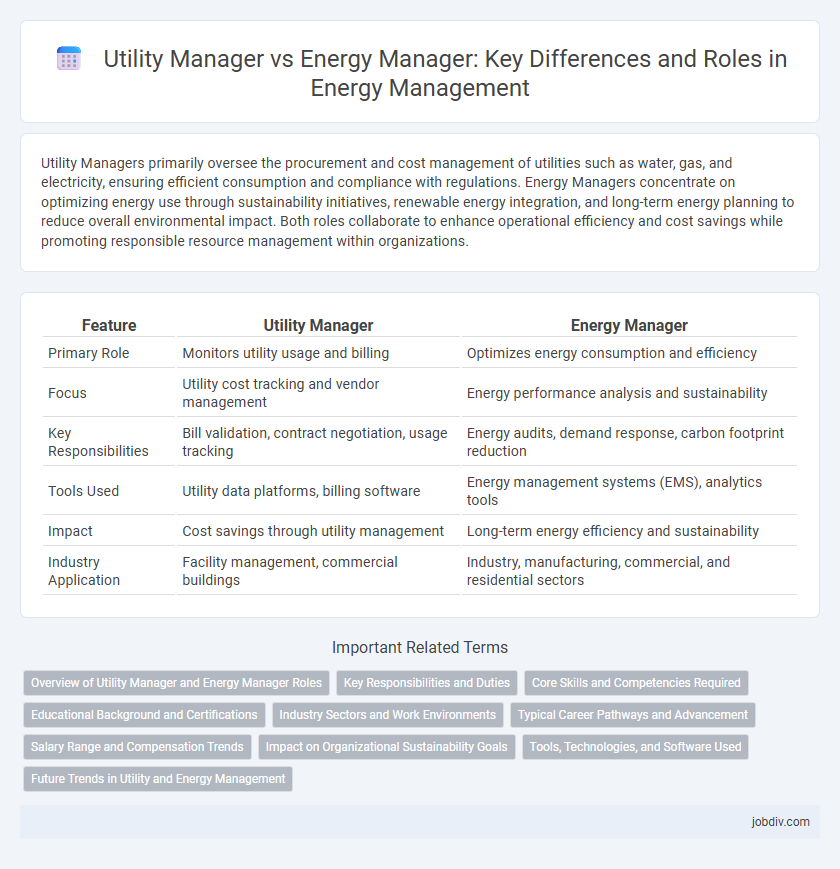Utility Managers primarily oversee the procurement and cost management of utilities such as water, gas, and electricity, ensuring efficient consumption and compliance with regulations. Energy Managers concentrate on optimizing energy use through sustainability initiatives, renewable energy integration, and long-term energy planning to reduce overall environmental impact. Both roles collaborate to enhance operational efficiency and cost savings while promoting responsible resource management within organizations.
Table of Comparison
| Feature | Utility Manager | Energy Manager |
|---|---|---|
| Primary Role | Monitors utility usage and billing | Optimizes energy consumption and efficiency |
| Focus | Utility cost tracking and vendor management | Energy performance analysis and sustainability |
| Key Responsibilities | Bill validation, contract negotiation, usage tracking | Energy audits, demand response, carbon footprint reduction |
| Tools Used | Utility data platforms, billing software | Energy management systems (EMS), analytics tools |
| Impact | Cost savings through utility management | Long-term energy efficiency and sustainability |
| Industry Application | Facility management, commercial buildings | Industry, manufacturing, commercial, and residential sectors |
Overview of Utility Manager and Energy Manager Roles
Utility Managers oversee the procurement, distribution, and cost management of utilities such as water, gas, and electricity, ensuring operational efficiency and regulatory compliance within facilities. Energy Managers focus on optimizing energy consumption, implementing sustainability initiatives, and driving energy-saving projects to reduce overall costs and environmental impact. Both roles collaborate to enhance resource management, but Utility Managers emphasize utility services administration, while Energy Managers prioritize energy efficiency and conservation strategies.
Key Responsibilities and Duties
Utility managers oversee the procurement, distribution, and billing of utilities such as water, electricity, and gas, ensuring cost-efficiency and regulatory compliance. Energy managers focus on optimizing energy consumption, implementing sustainability initiatives, and reducing environmental impact through energy audits and efficiency projects. Both roles require data analysis and strategic planning but differ in scope, with utility managers handling resource logistics and energy managers driving conservation strategies.
Core Skills and Competencies Required
Utility Managers require expertise in utility operations, regulatory compliance, and cost control to ensure efficient management of water, gas, and electricity services. Energy Managers focus on energy auditing, sustainability strategies, and renewable energy integration to optimize energy consumption and reduce environmental impact. Both roles demand strong analytical skills, project management capabilities, and proficiency in energy management systems (EMS).
Educational Background and Certifications
Utility Managers typically possess a background in engineering, environmental science, or business administration, emphasizing facility management and utility operations. Energy Managers often hold degrees in energy management, sustainability, or mechanical engineering and acquire certifications like Certified Energy Manager (CEM) to demonstrate expertise in energy audits, efficiency, and renewable energy systems. Both roles require specialized knowledge, but Energy Managers focus more on strategic energy planning and regulatory compliance through targeted education and professional credentials.
Industry Sectors and Work Environments
Utility Managers primarily operate within manufacturing, commercial real estate, and municipal sectors, overseeing utility services such as water, gas, and electricity to ensure cost-effective and efficient operations. Energy Managers concentrate on diverse industries including industrial plants, corporate facilities, and government institutions, implementing energy-saving strategies and sustainability practices to optimize energy consumption and reduce carbon footprints. Work environments for Utility Managers often involve direct coordination with infrastructure and maintenance teams, while Energy Managers engage closely with environmental compliance, engineering, and strategic planning departments.
Typical Career Pathways and Advancement
Utility Managers often progress from roles in facility operations or maintenance, gaining expertise in managing energy supply contracts and infrastructure. Energy Managers typically advance through positions in energy analysis or sustainability, focusing on optimizing consumption and implementing cost-saving measures. Both career paths offer opportunities for leadership roles in corporate energy strategy, but Utility Managers tend to move towards operational management, while Energy Managers often transition into environmental compliance and energy policy development.
Salary Range and Compensation Trends
Utility Managers typically earn a salary ranging from $70,000 to $110,000 annually, reflecting their responsibility for overseeing utility services and infrastructure. Energy Managers, specializing in energy efficiency and sustainability initiatives, command higher compensation, often between $80,000 and $130,000, due to increasing corporate focus on energy cost reduction and regulatory compliance. Compensation trends indicate a growing demand for Energy Managers with expertise in renewable energy and data analytics, driving salaries upward compared to traditional Utility Manager roles.
Impact on Organizational Sustainability Goals
Utility Managers optimize operational efficiency by overseeing utility consumption, ensuring cost control, and maintaining infrastructure reliability, directly reducing organizational carbon footprints. Energy Managers drive strategic energy initiatives, integrating renewable resources and implementing energy-saving technologies, advancing long-term sustainability targets. Both roles are crucial, with Utility Managers ensuring day-to-day efficiencies while Energy Managers guide transformative sustainability projects aligned with corporate environmental objectives.
Tools, Technologies, and Software Used
Utility Managers utilize automated metering infrastructure (AMI) and supervisory control and data acquisition (SCADA) systems to monitor and manage energy distribution networks, focusing on grid reliability and demand response. Energy Managers leverage energy management systems (EMS), building management systems (BMS), and advanced analytics software to optimize energy consumption, cost savings, and sustainability initiatives within facilities. Both roles employ IoT sensors and cloud-based platforms, but Utility Managers prioritize infrastructure operation tools, while Energy Managers focus on consumption efficiency and renewable integration technologies.
Future Trends in Utility and Energy Management
Utility Managers increasingly leverage IoT and smart grid technologies to optimize utility consumption and reduce operational costs in real time. Energy Managers focus on integrating renewable energy sources and enhancing energy efficiency through advanced analytics and AI-driven demand response systems. The convergence of digital transformation in both roles drives sustainable, data-driven decision-making frameworks for future energy and utility management.
Utility Manager vs Energy Manager Infographic

 jobdiv.com
jobdiv.com